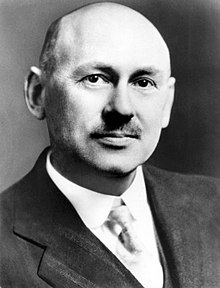
Back Robert Goddard Afrikaans روبرت جودارد Arabic روبرت جودارد ARZ Robert Qoddard Azerbaijani Роберт Годард Byelorussian Робърт Годард Bulgarian রবার্ট এইচ. গডার্ড Bengali/Bangla Robert Goddard BS Robert Hutchings Goddard Catalan Robert Goddard Czech
Robert H. Goddard | |
|---|---|
 | |
| Born | October 5, 1882[1] Worcester, Massachusetts, U.S. |
| Died | August 10, 1945 (aged 62)[1] Baltimore, Maryland, U.S |
| Nationality | American |
| Education | |
| Occupation(s) | Professor, aerospace engineer, physicist, inventor |
| Known for | First liquid-fueled rocket |
| Spouse |
Esther Christine Kisk
(m. 1924–1945) |
| Awards |
|
| Signature | |
Robert Hutchings Goddard (October 5, 1882 – August 10, 1945)[1] was an American engineer, professor, physicist, and inventor who is credited with creating and building the world's first liquid-fueled rocket, which was successfully launched on March 16, 1926.[2] By 1915 his pioneering work had dramatically improved the efficiency of the solid-fueled rocket, signaling the era of the modern rocket and innovation. He and his team launched 34 rockets between 1926 and 1941, achieving altitudes as high as 2.6 km (1.6 mi) and speeds as fast as 885 km/h (550 mph).[3]
Goddard's work as both theorist and engineer anticipated many of the developments that would make spaceflight possible.[4] He has been called the man who ushered in the Space Age.[5]: xiii Two of Goddard's 214 patented inventions, a multi-stage rocket (1914), and a liquid-fuel rocket (1914), were important milestones toward spaceflight.[6] His 1919 monograph A Method of Reaching Extreme Altitudes is considered one of the classic texts of 20th-century rocket science.[7][8] Goddard successfully pioneered modern methods such as two-axis control (gyroscopes and steerable thrust) to allow rockets to control their flight effectively.
Although his work in the field was revolutionary, Goddard received little public support, moral or monetary, for his research and development work.[9]: 92, 93 He was a shy person, and rocket research was not considered a suitable pursuit for a physics professor.[10]: 12 The press and other scientists ridiculed his theories of spaceflight. As a result, he became protective of his privacy and his work.
Years after his death, at the dawn of the Space Age, Goddard came to be recognized as one of the founding fathers of modern rocketry, along with Robert Esnault-Pelterie, Konstantin Tsiolkovsky and Hermann Oberth.[11][12][13] He not only recognized early on the potential of rockets for atmospheric research, ballistic missiles and space travel but also was the first to scientifically study, design, construct and fly the precursory rockets needed to eventually implement those ideas.[14]
NASA's Goddard Space Flight Center was named in Goddard's honor in 1959. He was also inducted into the International Aerospace Hall of Fame and National Aviation Hall of Fame in 1966, and the International Space Hall of Fame in 1976.[15]
- ^ a b c "Robert H. Goddard". New Mexico Museum of Space History. Retrieved January 25, 2023.
- ^ "Robert H. Goddard: American Rocket Pioneer". Smithsonian Institution Archives. Retrieved January 25, 2023.
- ^ "Goddard". Astronautix.com. Archived from the original on December 27, 2016.
- ^ Hunley, JD (Apr 1995). "The Enigma of Robert H. Goddard". Technology and Culture. 36 (2): 327–50. doi:10.2307/3106375. JSTOR 3106375. S2CID 113038190.
- ^ Cite error: The named reference
RockDevwas invoked but never defined (see the help page). - ^ "Sea Sky"..
- ^ "Archives". The Smithsonian Institution. Archived from the original on 2012-06-12. Retrieved 2010-06-06..
- ^ "Robert H. Goddard: American Rocket Pioneer" (PDF). Facts. NASA: 1–3. 2001-03-17. Archived from the original (PDF) on 2017-02-28. Retrieved 2010-06-06.
- ^ Cite error: The named reference
Caidinwas invoked but never defined (see the help page). - ^ Cite error: The named reference
Frankwas invoked but never defined (see the help page). - ^ "History Of Rocketry Timeline | Preceden". preceden.com. Retrieved 2021-08-09.
- ^ Swenson, Loyd S. Jr; Grimwood, James M; Alexander, Charles C (1989). "Part I, Chapter I". This New Ocean: A History of Project Mercury (The Highway to Space ed.). NASA. pp. 13–18. Archived from the original on 2016-03-04. Retrieved 2009-05-27.
- ^ Kluger, Jeffrey (March 29, 1999). "Rocket Scientist Robert Goddard". Time. Archived from the original on October 16, 2007. Retrieved 2010-04-23.
- ^ Lynn Jenner, ed. (March 29, 1999). "Dr. Robert H. Goddard: American Rocketry Pioneer". NASA. Archived from the original on 2019-01-01. Retrieved 2009-05-27..
- ^ Locke, Robert (October 6, 1976). "Space Pioneers Enshrined". Las Vegas Optic. Las Vegas, New Mexico. Associated Press. p. 6 – via Newspapers.com.
© MMXXIII Rich X Search. We shall prevail. All rights reserved. Rich X Search